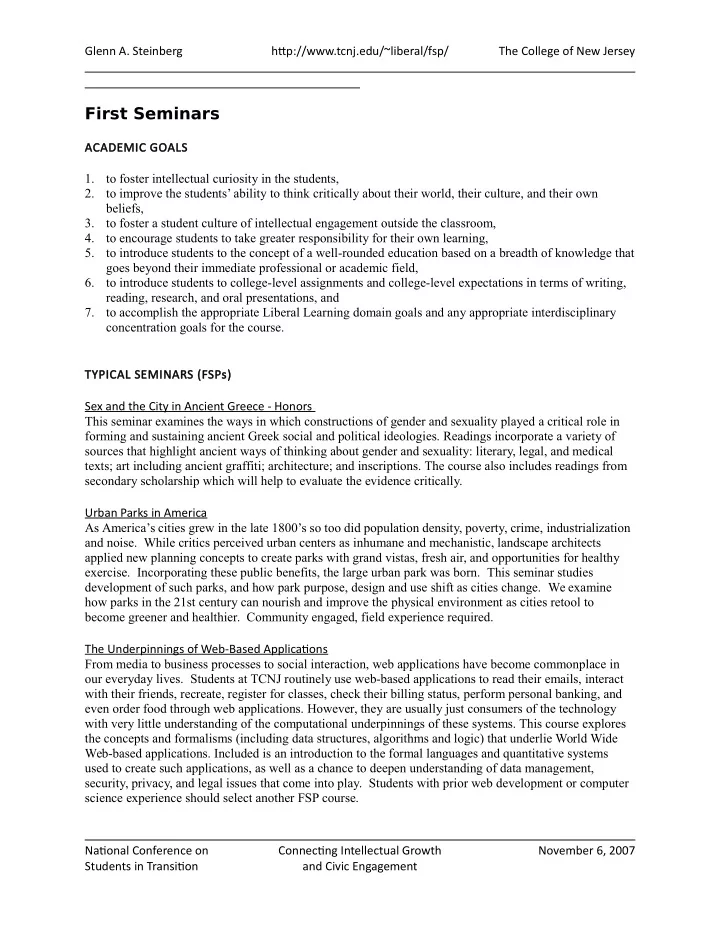

Glenn A. Steinberg htup://www.tcnj.edu/~liberal/fsp/ The College of New Jersey First Seminars ACADEMIC GOALS 1. to foster intellectual curiosity in the students, 2. to improve the students’ ability to think critically about their world, their culture, and their own beliefs, 3. to foster a student culture of intellectual engagement outside the classroom, 4. to encourage students to take greater responsibility for their own learning, 5. to introduce students to the concept of a well-rounded education based on a breadth of knowledge that goes beyond their immediate professional or academic field, 6. to introduce students to college-level assignments and college-level expectations in terms of writing, reading, research, and oral presentations, and 7. to accomplish the appropriate Liberal Learning domain goals and any appropriate interdisciplinary concentration goals for the course. TYPICAL SEMINARS (FSPs) Sex and the City in Ancient Greece - Honors This seminar examines the ways in which constructions of gender and sexuality played a critical role in forming and sustaining ancient Greek social and political ideologies. Readings incorporate a variety of sources that highlight ancient ways of thinking about gender and sexuality: literary, legal, and medical texts; art including ancient graffiti; architecture; and inscriptions. The course also includes readings from secondary scholarship which will help to evaluate the evidence critically. Urban Parks in America As America’s cities grew in the late 1800’s so too did population density, poverty, crime, industrialization and noise. While critics perceived urban centers as inhumane and mechanistic, landscape architects applied new planning concepts to create parks with grand vistas, fresh air, and opportunities for healthy exercise. Incorporating these public benefits, the large urban park was born. This seminar studies development of such parks, and how park purpose, design and use shift as cities change. We examine how parks in the 21st century can nourish and improve the physical environment as cities retool to become greener and healthier. Community engaged, field experience required. The Underpinnings of Web-Based Applicatjons From media to business processes to social interaction, web applications have become commonplace in our everyday lives. Students at TCNJ routinely use web-based applications to read their emails, interact with their friends, recreate, register for classes, check their billing status, perform personal banking, and even order food through web applications. However, they are usually just consumers of the technology with very little understanding of the computational underpinnings of these systems. This course explores the concepts and formalisms (including data structures, algorithms and logic) that underlie World Wide Web-based applications. Included is an introduction to the formal languages and quantitative systems used to create such applications, as well as a chance to deepen understanding of data management, security, privacy, and legal issues that come into play. Students with prior web development or computer science experience should select another FSP course. Natjonal Conference on Connectjng Intellectual Growth November 6, 2007 Students in Transitjon and Civic Engagement
Glenn A. Steinberg htup://www.tcnj.edu/~liberal/fsp/ The College of New Jersey Living-Learning Arrangement GOALS FOR LIVING AND LEARNING COMMUNITIES 1. to assist first-year students in forming peer communities and healthy social bonds, 2. to create an academically supportive residential environment, 3. to encourage socializing around academic interests and unmoderated intellectual discussions in the residence halls, 4. to foster intellectual community as an integral part of the peer communities formed by first-year students, 5. to encourage students to take greater responsibility for conditions in their community and their nation, 6. to encourage the presence and involvement of faculty in the residence halls, 7. to promote cooperation between faculty and Student Life staff, and 8. to make group work, study sessions, film screenings, writing workshops, field trips, and other similar learning activities for the FSPs easy to organize and effect. SAMPLE FLOORS IN THE RESIDENCE HALLS Cromwell 4 Baseball & American Culture FSP 13106 Cromwell 4 Consrvtn Bio:Preserving Our Mo FSP 14105 Cromwell 4 Data Mining and Predictive Mod FSP 15103 Cromwell 4 Science and the Twenty-First C FSP 14104 Wolfe 7 American Autobiographies FSP 13105 Wolfe 7 American Cult&Civil Rights Mvm FSP 13202 Wolfe 7 Color FSP 14101 Wolfe 7 Evolution of the Evolution Con FSP 13104 Travers 3 Art and Lit Respond to Authori FSP 10107 Travers 3 Deconstructing Autism:A View f FSP 12107 Travers 3 Schools and the American Dream FSP 12111 Travers 3 Simplify, Simplify:Values and FSP 12120 ASSESSMENT AND CHALLENGES Quality control o Proposal process Syllabi review o Anonymous student feedback forms (final course evaluation of teaching) o o New Jersey Course Outcomes Survey (NJ-COS) Collegiate Learning Assessment (CLA) o Future – faculty survey on course requirements and pedagogy? o o Future – scoring of sampling of papers with a very basic rubric Future – focus groups in intermediate-level courses o Student choice (or lack thereof?) o Website improvements Focus group and anecdotal data o o Future? Coordination between faculty and residential staff Future – faculty and student staff surveys on collaboration (or lack thereof) o Natjonal Conference on Connectjng Intellectual Growth November 6, 2007 Students in Transitjon and Civic Engagement
Glenn A. Steinberg htup://www.tcnj.edu/~liberal/fsp/ The College of New Jersey o Future – incentives for student staff Natjonal Conference on Connectjng Intellectual Growth November 6, 2007 Students in Transitjon and Civic Engagement
Recommend
More recommend